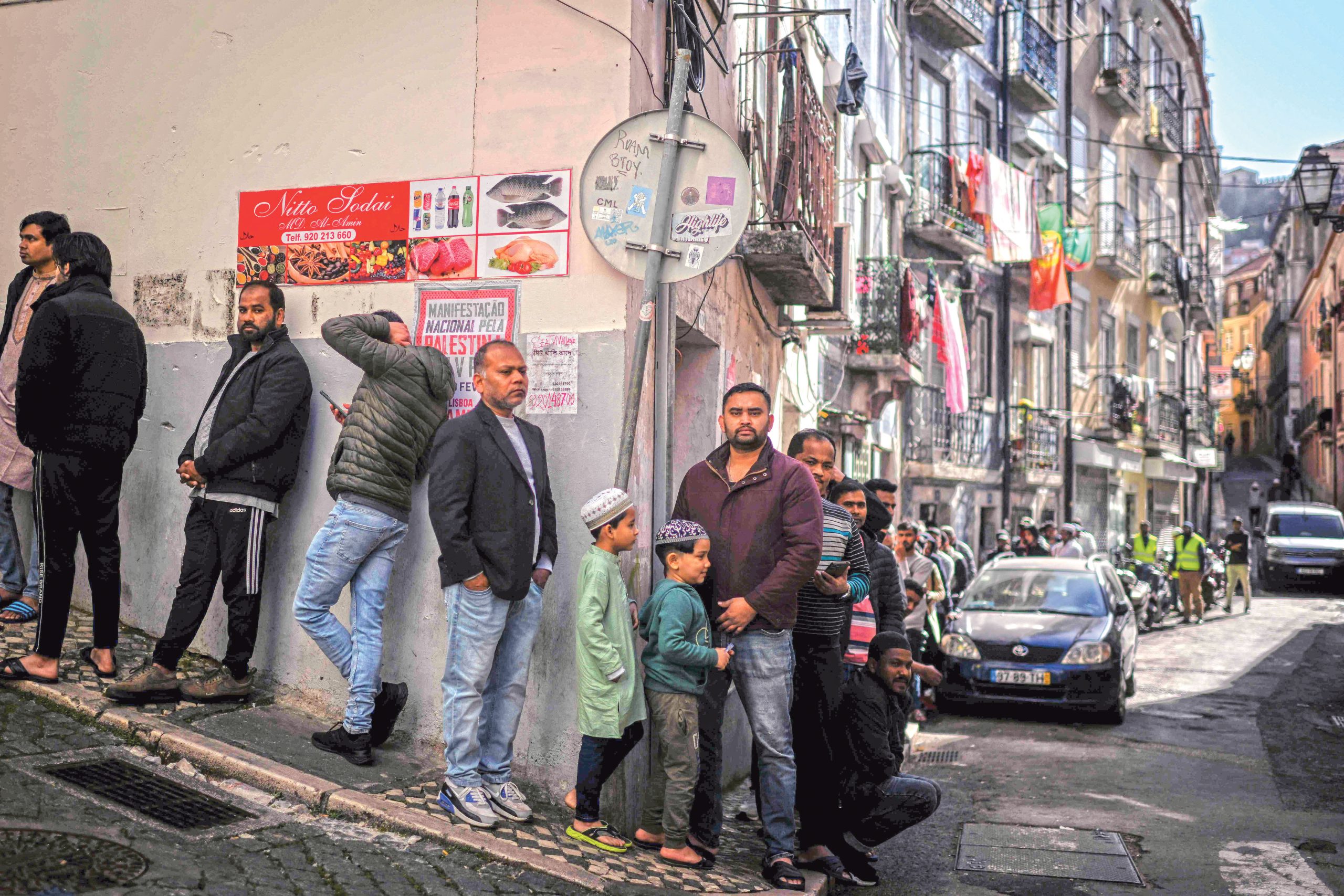Agreement to advance April 1 with management government

The agreement on labor migration will be signed on April 1, even with the government in management, the sun is born. In fact, this was already the interpretation of the business entities contacted by our newspaper. For the president of AEP, ‘this agreement is urgent to ensure the rapid and effective integration of labor in the country, and must be made possible with the maximum speed’. Luís Miguel Ribeiro acknowledges that it is « fundamental that public entities assume an active and responsible role in the integration of these immigrants, in addition to the employment contract ensured by companies. » But it leaves a message regarding the impositions initially advanced by the Executive: « In a scenario of housing crisis and in a national and international context of uncertainty, this responsibility should not fall exclusively on employing entities. »
In response to the suggested measures, the person in charge gives as an example the initiatives that AEP has participated, such as collaboration with the Fund for Asylum, Migration and Integration-FAFFO 2030, “with the purpose of streamlining labor mobility programs, promoting the attraction and fixation of foreign labor, namely, for sectors such as agriculture, industry, construction, tourism and other services,” he says to our newspaper. In addition, the entity has been carrying out training for immigrants in Portuguese for two years, covering up to 2,042 foreign citizens, making it easier for their professional and sociocultural and community integration.
Luís Miguel Ribeiro acknowledges that the lack of labor is one of the main constraints to the activity of companies. In fact, according to a recent AEP survey to its members, eight out of ten entrepreneurs consider that the difficulty of hiring labor is a factor that impacts their activity very significantly or significantly.
Also the secretary general of Ahresp recalls the statements that have been made by the executive who has been mentioning that the process will not stop. Ana Jacinto believes that « some of the initially foreseen requirements will be adjusted, namely the obligation of employment contracts are permanent, which is no longer an imposed condition. »
According to the official, « this decision, to be realized, responds to concerns manifested by business associations, including AHRESP, which has always defended the need for contractual flexibility so that companies can adapt to the seasonality of tourism », adding that « unintentionally weaves major considerations about virtues or defects of the action plan for migrations, the current strategy for immigration has been implemented by being implemented with concrete goals and objectives’, involving the participation of business associations, including the association. «We are doubly involved in this process: on the one hand, as a representative association of tourism, the activity that most employs foreign workers; On the other hand, as an entity responsible for a local Migrant Integration Support Center (CLAIM).
Still, Ana Jacinto acknowledges that with the fall of the government and with new legislative and municipal elections on the horizon it is natural that there are some impacts on the continuity of this plan. But in the face of this scenario it does not hesitate: “We will continue to defend the maintenance of a strategy that combines the regulation of immigration with working conditions for workers and the effective response to the needs of companies, regardless of the government that may be elected. Tourism needs agile solutions to hiring workers so that processes are faster and more efficient. It states that “it is essential that immigration will continue to be seen as a strategic solution to the national economy, not as a secondary issue subject to political change. After all, most migrants who arrive in our country come precisely in search of job opportunities, and tourism activity is available to welcome and integrate.
Integrated Solutions
Regarding the measures advanced by the government, namely regarding the need for training and housing that would be the responsibility of the employer, the secretary general of AHRESP says that some aspects require greater analysis and reflection, namely the requirement of contractless hiring and housing conditions. « The issue of housing is one of the most complex challenges, as it requires structural solutions that go beyond the ability of companies and should be thought of integrated by the government and the municipalities, » he says.
However, it argues that it is imperative to move forward with the agreement, as its execution is up to administrative entities and draws attention to the fact that the sector needs « concrete and rault responses », regardless of the political context. «You need to find solutions that are balanced and effective. We urgently need political stability so that measures such as these can advance without mishaps and for companies to be able to safely plan their future.
And although it cannot quantify the number of immigrant workers they need for restoration and tourist accommodation, Ana Jacinto states that « it is undeniable the scarcity of workers on the Horeca channel, especially in restoration and the like, where immigrants have been fundamental to collect this need », hence it is necessary to streamline the hiring and integration processes of these professionals, while ensuring their qualification and training for different functions and training processes at the same time. operational. «AHRESP has actively worked in this regard. A recent example is the involvement of the Association in the dissemination and promotion of the ‘Integrating to Tourism’ program – an initiative that aims to welcome, qualify and integrate migrants into the tourist activity labor market – with entrepreneurs.
Expedite processes
Also the Secretary-General of the Portuguese Farmers Confederation (CAP) believes that the program is walking, so much so that « companies can not be in a water bath and workers who are accurate to pick up the harvests do not expect or not government and companies with or without government have to work in it and the protocol is a congregation of good wills, » says our newspaper.
Luís Mira recalls that it is an agreement to which CAP has already made it available to sign and as it does not provide for new legislation, but to comply with that there is already an effort between the state, companies and the municipalities themselves to create conditions for workers, namely with regard to housing, for immigrants to live in worthy conditions. “Anyone who has a blueberry or raspberry campaign ahead must continue to work and cannot be waiting for the protocol. Of course, then what is intended is that there is a speed of processes and easier to create conditions in housing so that people come and settle in a condition because Odemira’s story is all badly told. The companies wanted to build brick and cement houses and it was the Odemira Chamber, the ICNF (Institute for the Conservation of Nature and Forests) and the state that did not leave and said to put such removable containers, ”he says.
He adds: “These people don’t come here to have a pool house. They come to work, of course they need to be able to live, but they are temporary workers. They are not here all year. When are the military when they are in campaign stay in homes or in tents? I am not saying to be on tents, but Huelva’s example can follow in Portugal: immigrants are in camarate, men on one side and women on the other, with bathrooms, doctors, social assistance. Let’s not invent any miraculous solution because it already exists.
Regarding the issue of training, Luís Mira recalls that companies and the Labor Code itself already include this obligation, but removes a scenario, in which responsibility is only on the business side. «There is IEFP, there are training programs and it is necessary to enjoy it. Now it can neither the state push to companies nor the companies push into the state. Everyone has to collaborate in search of the best solution. And it states that each sector has its needs: “Later this week I was in a restaurant and I was attended by a girl from Nepal who spoke poorly Portuguese. These workers really need training, now to catch blueberries do not need to speak Portuguese. And they are more productive than the Portuguese, they have no comparison. First because they focus more, then they have some more delicate hands to catch those little berries.
Projects concerned
Also Albano Ribeiro, president of the Portuguese Construction Union, says that the solution to the problem of immigrant labor would be training in countries of origin, as is already done by some companies in the sector. « This is the way we should go, neither it took government, nor anyone, » says the sunrise.
And regrets the situation with which many immigrants come across when they arrive in our country. “Many have no sites where to sleep, they have no cafeterias, they have nothing. Does this have any dignity in the contemporary world? It’s anything but worthy, ”he laments. « The things that are going through in the 21st century are inadmissible, we are facing modern slavery, » he continues. « There are cases that come to the union and do not even have a contract. »
To aggravate this situation is that, according to the union leader, most workers who arrive in Portugal are not qualified. «Whose works are done with? At this moment there is no one to form construction workers and those who arrive are not qualified workers and it is not this labor that the construction sector needs, ”he says.
According to Albano Ribeiro’s accounts, the sector needs more than one hundred thousand workers to respond to all advertised works. It is not only in housing, as in new projects, such as the new airport, the new Tagus crossing and the new hospital in Lisbon. « Even now they have announced that they will turn IP3 into a highway, but who will build this great extension? » He asks.








